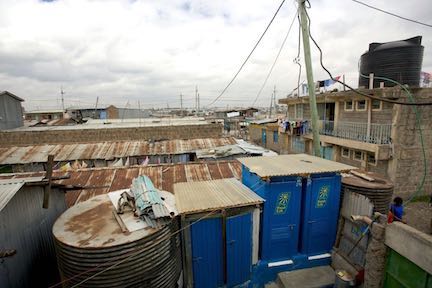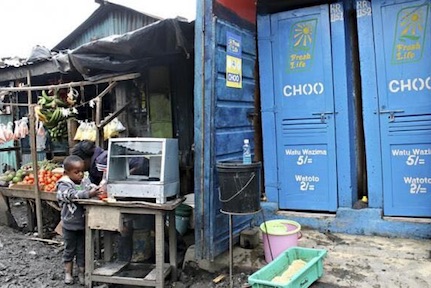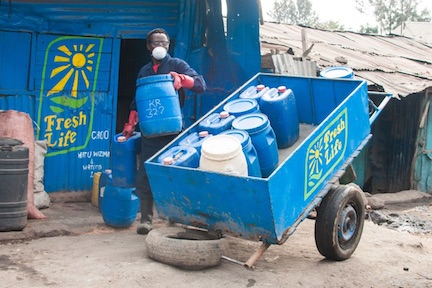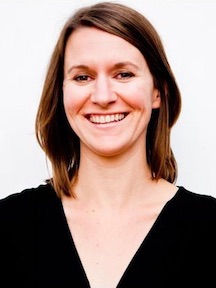By Julie Block
Lindsay Stradley gives a shit.
That’s what the Yale graduate and Phi Beta Kappa member told a crowd of people at her TED talk, entitled “Why We Need To Talk Shit.”
Stradley is the co-founder of Sanergy, a non-profit aimed at addressing sanitation issues in urban areas. She currently lives in Nairobi, Kenya, though she grew up in Atlanta. She says her fascination with tackling urban poverty started young, when she witnessed it around her home city.
That fascination grew at Yale, where Stradley majored in American studies with a specialization in urban studies. She wanted to fight poverty in cities, but the problem was so big, she didn’t know how to tackle it…until she joined Teach for America and moved to New Orleans.
In her third year of teaching high school math, Hurricane Katrina devastated the city. Mold festered in people’s homes, and when residents finally returned to clear it all out, trash poured into the streets. Without electric, water, and sewage systems, business essentially stalled. In a city already rocked by poverty, families found it extremely difficult to rebuild. Stradley says she saw students lose interest in fostering their talents in New Orleans and keeping them there post-graduation to help their city get back on its feet.
“All my students thought I was kind of nuts to move from Atlanta to New Orleans,” Stradley said. “There aren’t a lot of good jobs in New Orleans. Students didn’t want to get a job there.”
In places like New Orleans, the government has funding to get the massive electrical and pipe systems back up and running, at least for basic necessities, fairly quickly after tragedy strikes. But even in that short time when neighbors in New Orleans were cut off from technology the rest of the country uses to get through daily activities, Stradley says the disconnect set the city’s economy back enormously. She began to think—what about cities without those systems built in? How can those citizens focus on finding a stable job or going to school when they have to live every day like the people of New Orleans did in the aftermath of Katrina? How do you improve economies, solve social issues, or address health crises without access to the system that seems to keep all the first-world societies afloat? How do you prevent urban dwellers from falling into poverty without a proper way to deal with their shit?
“This disconnect impacts everything. Health, the environment, the economy, and education. Women and girls are especially vulnerable to poor sanitation, a gender disparity that plays out all too well in education,” Stradley said in her TED Talk. “The causes and consequences are clear. Now the solutions. What can we do? Well, we could spend billions of dollars and mobilizing millions of people to relocate so that we can install massive sewer systems, but we don’t have the time, space, or money to do that. Today’s cities need a new plan. We need to build new types of systems designed for the modern urban world of rapid urbanization and impending water scarcity.”
So, after getting her MBA at MIT, she helped found Sanergy: a company that builds low-cost, waterless toilets for urban communities around the world. In places like Nairobi, neighbors have to pay to use toilets in the community, because they are so scarce. Sanergy franchises their toilets to community members who run them as a businesses, to landowners who include them in rent packages, and to schools who use them for their students. That way, Stradley says, girls don’t have to skip school during menstruation, and there is more cash flow through the economy. To top it all off, Sanergy collects the waste, removes it from the community, and converts it to products like fertilizer. Farmers can use the fertilizer to grow more crops, and, as a result, address food insecurity. Stradley says that kind of model raises the bar for innovation, while lowering the cost of providing sanitation.
“Pretty much everything that had been done in sanitation up to that point was really a focus on providing a good toilet, which only lasts so long if there’s not a sustainability mechanism built in” Stradley said. “When we started Sanergy, we came at it from a position of, what is a social challenge that is really affecting poor people around the globe, and how can we solve that problem in a way that creates jobs and creates income for the very people who are also experiencing these social and health problems?”
Connecting those dots to tackle an extremely complex problem was not something Stradley says was simple to figure out. It’s not something she says she even thought she would be doing when she enrolled at Yale. After all, she said in her TED talk, who wants to talk shit for a living? But she says it was the rigor and breadth of her liberal arts education at Yale that allowed her to see through what avenue she could facilitate change.
“It wasn’t something that came with knowing, this is what I want to do, but I was motivated to try new things and test your limits and know you were going to be supported in doing that,” Stradley said. “I wanted to dive into new academic areas I knew nothing about and pursue them really to the fullest… the kind of curiosity instilled through a liberal arts education was such a fundamental part of who I am today.”
And graduating Phi Beta Kappa was the icing on the cake. Stradley says she didn’t realize at the time what kind of merit she could hold in the business world with the addition of those letters. She says investors, potential business partners, and city governments that she works with may feel more stable in teaming up with Sanergy because the Phi Beta Kappa title means a certain level of guaranteed responsibility.
“Investors and partners can immediately identify you as someone who is going to be both an intelligent partner but also work really hard and being committed to achieving excellence in that work, so it brings an instant level of credibility,” Stradley said. “What Phi Beta Kappa represents is that commitment to excellence.”
And while Stradley says she never thought at the time that she would be committed to achieving excellence in toilet technology, she says she’s never felt better about her contribution to bettering societies around the globe. So, she says, it’s about time the rest of the world started talking shit.
“For cities to thrive, we need to talk about smarter systems that service the facilities of tomorrow,” she said in her TED talk. “We need everyone to sit at the table and talk about shit, so that, as young people decide their career paths, developing economies craft their budgets and philanthropists decide their priorities, they all give a shit.”

Toilets provided by Sanergy that are used in the community of Nairobi, Kenya.

A Sanergy employee removing waste from a Sanergy toilet to be converted into fertilizer (below).

Julie Block graduated Phi Beta Kappa from DePauw University in 2017. She earned a Bachelor of Arts degree in English Writing and currently works as an Associate Producer at FOX59 News. DePauw University is home to the Alpha of Indiana Chapter of Phi Beta Kappa.
Photos courtesy of Sanergy.




